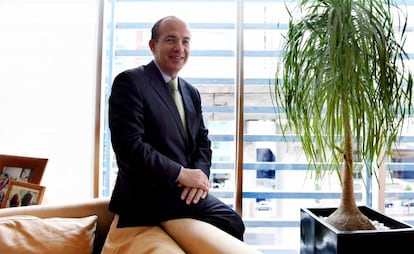Felipe Calderón: “Abuses were committed but they were the exception, not the rule”
Mexican ex-president says his war on drugs stopped parts of country falling under criminal control


Felipe Calderón Hinojosa, 52, who was president of Mexico between 2006 and 2012, will go down in history as the man who launched the greatest attack against organized crime in national collective memory.
The war was fought openly and on all fronts, leaving 70,000 dead, a fractured drug underworld and a trail of accusations of abuse and torture.
While Calderón admits that abuses were committed, he says they were the exception, and that without them essential portions of the Mexican state would have been taken over by organized crime.
The one-time leader of the National Action Party (PAN) defends his legacy in Los retos que enfrentamos (or The challenges we face), a new book that raises the alarm about Mexico’s institutional fragility.
Question. Why are you now coming out in defense of your actions while in office? Is it because of the criticism?
Answer. No. Every leader should be held accountable for his actions and explain both the circumstances he faces and the measures that he takes. And that is what I did.
Regrets are a part of a cultural legacy we received from the Spanish, and I’m not sure how grateful we should be for it
Q. Estimates talk about 60,000 to 70,000 deaths during your war on drugs. Is that not too many?
A. It is a huge amount. Each one of them weighed heavily on my mind, but all those murders were committed by the criminals I was fighting. The vast majority were a result of the merciless battle between criminal groups over territorial control of the country.
Q. The National Human Rights Committee, a state body, registered a significant rise in complaints over torture and abuse by law enforcement agencies during your mandate (over 5,600 between 2010 and 2012). What happened? Did they go unpunished?
A. Let me first remind you that the National Human Rights Committee is a constitutionally independent body. It is completely independent from the president. Out of all the complaints filed with the commission, fewer than two percent turned out to have any basis in truth and resulted in recommendations to federal forces. And every single one of those recommendations was followed by my government, without exception, with criminal inquiries opened where recommended.
Observing the law involves some risk-taking that not all leaders are ready to accept
Q. But abuses did exist, didn’t they?
A. It’s true, federal operations multiplied and sadly some abuses were committed. But these were the exception, not the rule, and every time the government became aware of them it acted to bring the perpetrators to justice.
Q. What would you change now about you security strategy?
A. I would have encouraged institutional reconstruction much earlier, with a greater impulse and more economic resources. I relied heavily on coordination with the states, but honestly I did not find enough of a political will everywhere. And where there wasn’t enough of it, we should have employed other constitutional mechanisms to ensure that necessary measures would not be postponed. Our institutions are not strong enough, and Mexico’s future is at stake there.
Q. In your book you ask for an overhaul of the judiciary.
A. We have a very good Supreme Court and we must use this to our advantage. Former president [Ernesto] Zedillo [1994-2000] did a good job of reorganizing that body, and that was very healthy for the judiciary. But the effort must be extended to federal magistrates across the country and of course to local judges as well.
Every death weighed heavily on my mind, but all those murders were committed by the criminals I was fighting
Q. Is this weakness behind the extremely high impunity levels in Mexico, where only three percent of crimes end in a conviction?
A. There are three factors involved. One has to do with the fragility of Mexico’s institutions. When I was elected president I found that a great many security and justice agencies – meaning public ministries, police and judges – were corroded by corruption. Secondly, observing the law involves some risk-taking that not all leaders are ready to accept. Thirdly, the crime rate is overwhelmingly high compared with the state’s ability to deal with it. A time comes in certain cities when the crimes are so numerous, and the authority figure so small and weak, that it has no ability to deal with it.
Q. What do you regret?
A. Regrets are a part of a cultural legacy we received from the Spanish, and I’m not sure how grateful we should be for it ...There were some good things and some things that could have been better. What could have been better? Institutional reconstruction, which is the answer to our most serious problem, a lack of safety on the streets. But I don’t like the word “regret.”
Q. Do you still have trouble sleeping?
A. I sleep somewhat better. I have fewer problems to think about.
Q. Do you see PAN president Gustavo Madero as the president of Mexico?
A. No, I don’t.
Q. When the PAN obtained power in 2000, it was the anti-corruption party. It is no longer viewed that way. What happened?
A. Unfortunately, you are right, and that hurts a lot. Most card-carrying members of the PAN are honest people. But there are well-known representatives, some of whom unfortunately still have positions of leadership within the PAN, who have carried out clear acts of corruption that the party should investigate and punish. In my view this has not happened yet, and as long as it doesn’t, the party will continue to labor under a stigma that runs counter to everything we have stood for throughout our history.
Q. Would you legalize the growing and sale of marijuana?
A. That is a matter for debate. We need a much more serious analysis of the social and economic consequences before making a decision. But I do think that a global review of the situation is urgently needed.
Tu suscripción se está usando en otro dispositivo
¿Quieres añadir otro usuario a tu suscripción?
Si continúas leyendo en este dispositivo, no se podrá leer en el otro.
FlechaTu suscripción se está usando en otro dispositivo y solo puedes acceder a EL PAÍS desde un dispositivo a la vez.
Si quieres compartir tu cuenta, cambia tu suscripción a la modalidad Premium, así podrás añadir otro usuario. Cada uno accederá con su propia cuenta de email, lo que os permitirá personalizar vuestra experiencia en EL PAÍS.
En el caso de no saber quién está usando tu cuenta, te recomendamos cambiar tu contraseña aquí.
Si decides continuar compartiendo tu cuenta, este mensaje se mostrará en tu dispositivo y en el de la otra persona que está usando tu cuenta de forma indefinida, afectando a tu experiencia de lectura. Puedes consultar aquí los términos y condiciones de la suscripción digital.








































